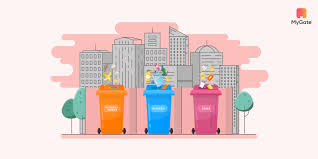We all very well know that wastes are of two types:
Bio-degradable
Non- degradable
To start with, every household creates some waste everyday and
it needs to be disposed of. As a first step if the waste is segregated properly,
the work is half done.
Let’s see what segregation is and why it is necessary?
Household
waste, also known as domestic Waste or residential waste, is disposable
materials generated by households. This waste can be comprised of non-Hazardous
Waste and hazardous waste. Non-hazardous waste can include food scraps, paper,
bottles, etc.
HOW WASTE MANAGEMENT IS
HANDLED IN CHENNAI?
Source separation is promoted to
reduce the waste coming to the Landfill, thereby increasing the life time of
the Landfills. The bio-degradable waste (Organic Waste) is being composted in a
decentralized manner at ward level by Ordinary and Vermi compost plants and Bio
methanation plants and manure used for GCC parks and greeneries besides open
sale to public also. Source separated thin plastics are subjected to shredding
in all units / zones and it has been used for laying Bituminous road laying.
The source Separated non- biodegradable (Dry Waste) collected on every Wednesdays
for recycling.
THE PROCESS INVOLVES:
- Street collection to disposal site.
- Transportation to disposal site from transfer
station.
- Collecting the Source Separated Waste from the
Households by Tricycles or Light Motor Vehicles and bio degradable waste
is being sent to decentralized waste processing facilities and dry waste
is being collected every Wednesday for recycle purpose and remaining waste
to transfer Stations/dump sites
WHAT THE AUTHOROTIES SAY?
“The SWM Rules 2016, clearly calls for three way
segregation of waste at source and each waste has clear destinations. In the
case of Chennai, organic waste at the micro compost centres, dry waste at the
material recovery facilities. In a ward, approximately you will receive 7 to 8
tonnes of compostable waste and 2 to 3 tons of recyclable waste, if we are able
to follow this properly at all wards and ensure that these waste reach their
right destinations, we will not need to dump waste in the landfills”, adds
Natarajan. “GCC needs to streamline MCCs, MRFs and make Bulk Generators
manage their waste. This is the only way forward”.
A BEST FOOT FORWARD:
A
few areas have managed to go bin-less successfully, however. THIRUVEEDHI
AMMAN KOVIL STREET is an example of this. The work was largely carried out
by the residential welfare association in the area. One of the first steps
towards removing the bins, was to adopt waste segregation in every household.
This was initiated as early as 2013. A key difference from the other examples
is that they also set up common compost pits for all houses and apartments, to
process wet waste. A majority of manure generated from the compost pits is used
for the street garden, and the remaining is sent to the corporation’s dry leaf
composting unit at a park in the vicinity.
These are the few steps taken in Chennai towards waste
management. Let us all support by contributing our bit and make our place a
better place to live in.



No comments:
Post a Comment